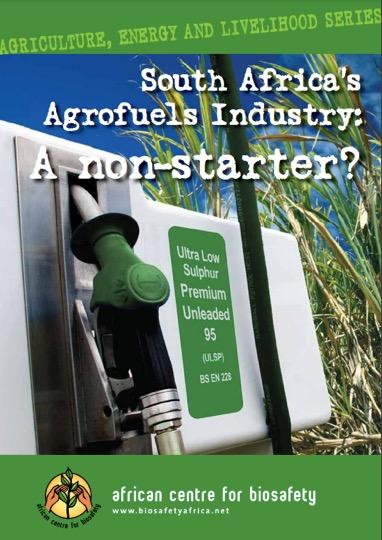Latest Resources

7 September 2011
Global grain giant Bunge, to enter SA market!
The Competition Commission has on 2nd September 2011, approved, with conditions, a joint venture between the multinational grain trader Bunge, and South African grain storage and trading company, Senwes. In terms of the joint venture, a separate legal entity, Bunge Senwes Proprietary Ltd, has been formed, with each party controlling 50%. According to Mariam Mayet […]

16 May 2011
Activists approach Competition Commission to Investigate Monsanto’s dominance in South Africa
Several groups in South Africa, including the African Centre for Biosafety (ACB), the Surplus People Project (SPP), Trust for Community Outreach (TCOE), the Food Sovereignty Campaign and Biowatch South Africa submitted a detailed report to the Competition Commission in support of their requests that the Commission investigate Monsanto’s extraordinary market power in South Africa. The […]

24 March 2011
South Africa’s Agrofuel’s Industry: A non-starter?
This paper provides a brief overview of the biofuels industry in the context of the South African government’s 2008 policy. Our key finding is that the large-scale biofuels industry has stagnated almost to the point of non-existence. There is, however, a growing impetus to address the shortcomings in government policy that has held the industry […]

9 March 2011
How US sorghum seed distributions undermine the FAO Plant Treaty’s Multilateral System
New data from ICRISAT and the US Department of Agriculture and a comparison of genebank records indicates that half of more of ICRISAT’s sorghum genebank collection is also being distributed outside of the Multilateral System. This yawning gap creates an economic incentive for the Multilateral System and its benefit-sharing requirements to be avoided. USDA’s sorghum […]

19 February 2011
Agrochemical giant DuPont to sell Bolivian sorghum gene
In 2012 multinational giant DuPont plans to begin selling sorghum varieties containing a valuable gene taken from a sudan grass that was collected in 2006 in Bolivia. The gene, branded as ‘Inzen A II’, makes sorghum plants tolerant to herbicides made by DuPont and other companies, and was acquired under exclusive license from Kansas State […]

16 February 2011
African Millet Under Threat
The African Centre for Biosafety (ACB) has focused several recent reports on new international commercial interest and patent claims on the African native crop sorghum. This includes the issues raised by the proposed widespread use of sorghum for the production of agrofuels. This report extends ACB’s examination of new international commercial interest in African native […]

16 February 2011
Response to the Environment Green Paper 2010
The ACB has submitted comments on the Department of Environmental Affairs’ National Climate Change Response Green Paper. Read here.

4 February 2011
Sorghum and the Antioxidant Craze: What Benefit for Africa’s Farmers?
A highly successful health food company in the United States, Silver Plate Inc, is seeking to cash in on the health benefits of sorghum. More particularly, it has begun to commercialize foods rich in sorghum anthocyanins, natural “antioxidant” chemicals found in some strongly coloured plant foods that are believed to have heart and other health […]

8 December 2010
Competition Commission rejects Pioneer Hi Bred seed takeover
Media Advisory from the African Centre for Biosafety Johannesburg, 8th December 2010. The African Centre for Biosafety applauds the decision of the Competition Commission not to approve the take-over of Pannar Seed, South Africa’s largest seed company, by the multinational corporation and seed giant, Pioneer Hi-Bred, a subsidiary of the DuPont chemical company. The ACB […]

3 December 2010
Deep concern: Patel’S New Growth Path (NGP) supports Green Revolution for smallholder farme...
Dear friends and colleagues, The ACB is deeply disturbed and disappointed that Minister Patel’s NGP has not embraced new thinking on agriculture policy which requires breaking from a wholly inequitable and ecologically unsustainable chemical-dependent system. The NGP lacks vision as it has missed an important moment to move South Africa towards systems that reconnect food […]
